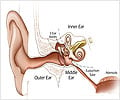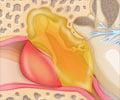In a breakthrough study, researchers have developed a new stem cell therapy that may help in treating hearing impairment.
In a breakthrough study, researchers have developed a new stem cell therapy that may help in treating hearing impairment.
Deafness typically involves the loss of sensory receptors, called hair cells, for their "tufts" of hair-like protrusions, and their associated neurons.Led by Dr. Marcelo N. Rivolta of the University of Sheffield, researchers have has successfully isolated human auditory stem cells from foetal cochleae (the auditory portion of the inner ear) and found that they could be differentiated into sensory hair cells and neurons.
The researchers carefully dissected and cultured cochlear cells from 9-11 week-old human fetuses.
They then expanded the cells and maintained in vitro for up to one year, with continued division for the first 7 to 8 months and up to 30 population doublings, which is similar to other non-embryonic stem cell populations, such as bone marrow.
Gene expression analysis showed that all cell lines expressed otic markers that lead to the development of the inner ear as well as markers expressed by pluripotent embryonic stem cells, from which all tissues and organs develop.
The researchers could formulate conditions that allowed for the progressive differentiation into neurons and hair cells with the same functional electrophysiological characteristics as cells seen in vivo.
Advertisement
Although the hair cell-like cells did not show the typical formation of a hair bundle, the authors suggest that future studies will aim to improve the differentiation system.
"Although considerable information has been obtained about the embryology of the ear using animal models, the lack of a human system has impaired the validation of such information," noted the authors.
Dr Ralph Holme, director of biomedical research for Royal National Institute for Deaf and Hard of Hearing People, said: "There are currently no treatments to restore permanent hearing loss so this has the potential to make a difference to millions of deaf people."
The study is published in the April issue of Stem Cells.
Source-ANI
SRM












